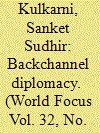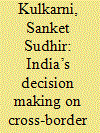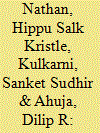|
|
|
Sort Order |
|
|
|
Items / Page
|
|
|
|
|
|
|
| Srl | Item |
| 1 |
ID:
105528


|
|
|
| 2 |
ID:
147216


|
|
|
|
|
| Summary/Abstract |
In the last two decades, cross-border gas pipelines have become an integral part of discourse on India’s energy security. Successive reports from the government and the private sector have envisaged an important role for cross-border gas pipeline projects in India. After engaging in negotiations for several years, the Indian Government finally joined the Turkmenistan, Afghanistan, Pakistan and India (TAPI) gas pipeline over the Iran–Pakistan–India pipeline (IPI) and the Myanmar–Bangladesh–India pipeline (MBI). Several critics of this project have questioned this decision of the Indian Government to join TAPI due to the huge levels of risks involved and the project’s commercial unviability. The article is an attempt to understand the decision-making process of the Indian Government on cross-border gas pipeline projects and its rationale for choosing a seemingly riskier project like the TAPI pipeline and letting go of the other two pipeline projects. The article makes an attempt to conduct a detailed discussion around such factors that contributed to India’s decision making on these projects.
|
|
|
|
|
|
|
|
|
|
|
|
|
|
|
|
| 3 |
ID:
125706


|
|
|
|
|
| Publication |
2013.
|
| Summary/Abstract |
India's energy situation is characterized by increasing energy demand, high fossil fuel dependency, large import shares, and significant portion of population deprived of modern energy services. At this juncture, natural gas, being the cleanest fossil fuel with high efficiency and cost effectiveness, is expected to play an important role. India, with only 0.6% of proven world reserves, is not endowed with adequate natural gas domestically. Nevertheless, there are gas reserves in neighbouring regions which gives rise to the prospects of three cross border gas pipeline projects, namely, Iran-Pakistan-India, Turkmenistan-Afghanistan-Pakistan-India, and Myanmar-Bangladesh-India. This study is a political analysis of these pipeline projects. First, it provides justification on use of natural gas and promotion of cross border energy trade. Then it examines these three pipeline projects and analyses the security concerns, role of different actors, their positions, shifting goals, and strategies. The study develops scenarios on the basis of changing circumstances and discusses some of the pertinent issues like technology options for underground/underwater pipelines and role of private players. It also explores impact of India's broader foreign relations and role of SAARC on the future of pipelines and proposes energy induced mutually assured protection (MAP) as a concept for regional security.
|
|
|
|
|
|
|
|
|
|
|
|
|
|
|
|
|
|
|
|
|